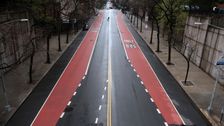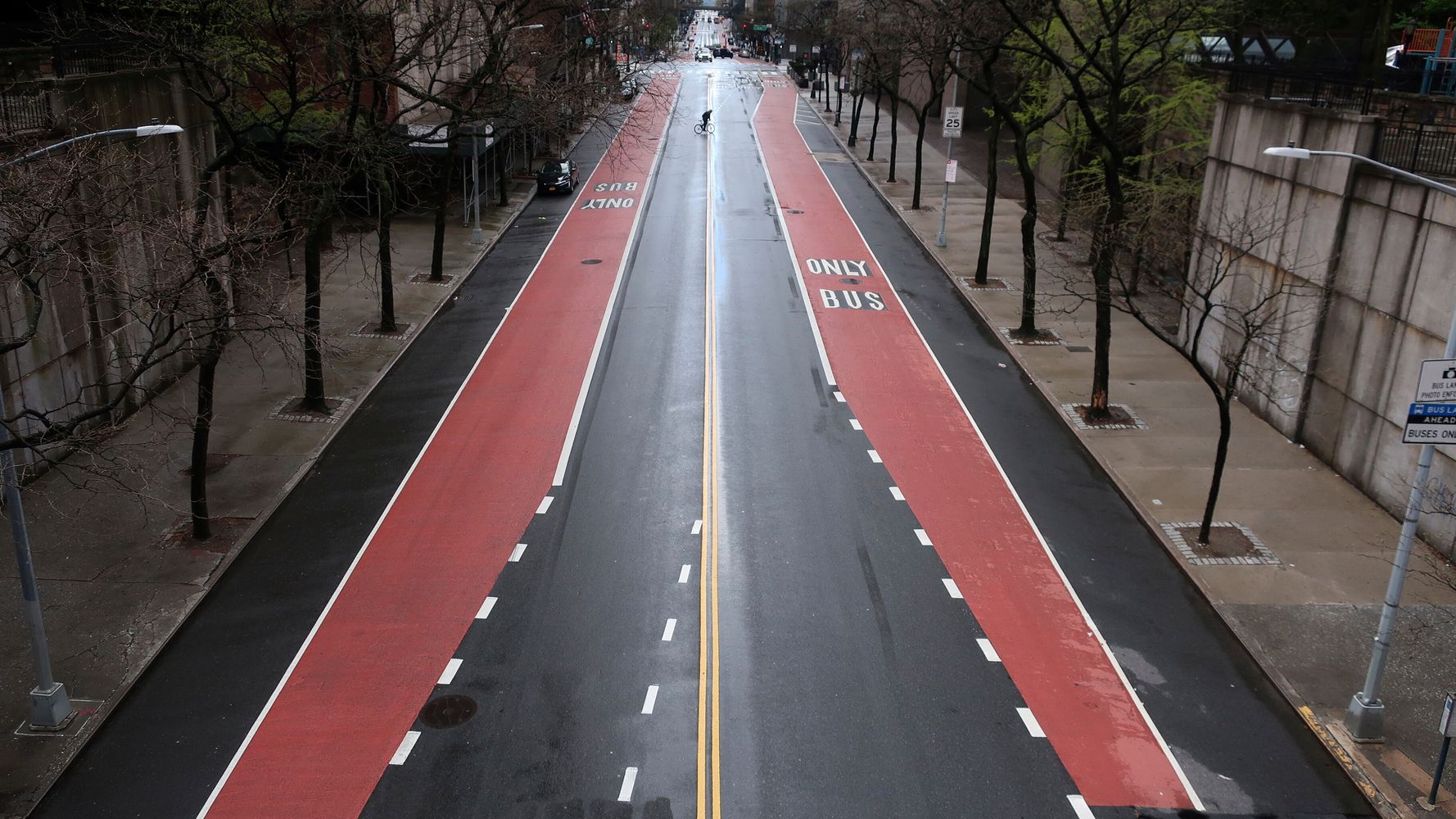[ad_1]

Broadway: shuttered. Neighborhood bars and restaurants: delivery and pickup only. The subway: emptied of commuters. As New York City buckles under the assault of the coronavirus pandemic, rapidly becoming one of the hardest-hit cities in the world, everything quintessentially New York has been blighted in some way.
Some of these things were already widely reviled and yet have reached new depths thanks to COVID-19. Let us consider, for example, the “why I left New York” essay, a genre made iconic by Joan Didion and then rapidly made trite by thousands of lesser writers who woke up one day and realized, stirringly, that a larger apartment could be had for less money literally anywhere else.
For years, the “why I left New York” essay has been a honeytrap for writers, an opportunity to muse with unearned solemnity about the most predictable traits of the city they chose to leave: It’s expensive, it’s exhausting, it’s dense, it’s hard to find nature or a dishwasher or a parking space.
In the face of an acute coronavirus outbreak, one more obvious motivation to flee for wide-open spaces has joined this list: “I didn’t want to be here, with all the sick people and crowded hospitals, sheltering in place in a smaller-than-ideal apartment.”
And so an already-suffering city has been assaulted with a slew of “why I let New York during the pandemic” essays: Masha Gessen in The New Yorker, Bryan Mealer in the Guardian, Business Insider editor Nick Lichtenberg in his own publication. Meghan Daum, a veteran of the standard “why I left New York” essay, scapegoated her new puppy in a piece for Medium’s GEN. The New York Times even published a graphic essay on the topic by artist Mira Jacob.
Aside from a few unique flourishes ― Mealer weaves in the history of his own great-grandmother and her daughter, who died in the 1918 flu epidemic ― all of these essays tread the same tedious ground: an acknowledgment that New Yorkers were meant to stay home, an enumeration of reasons why it was personally preferable for the author and their family to nonetheless relocate (a larger residence, the great outdoors, support from family, avoiding crowded NYC hospitals and grocery store lines), a catalog of hygiene practices followed during the illicit journey (Clorox wipes, mainly).
Most of Jacob’s essay, for example, is spent anxiously proclaiming that her family’s departure was done right, even with an overabundance of caution: When they stop in hotels and at drive-throughs, they wear gloves! They wipe everything down! Even things they didn’t touch!
While “privilege” is eagerly and often copped to, blame for actively selfish behavior is under-explored. Gessen and Daum dismissively note that they will fall afoul of a “narrative” that fleeing the city is harmful and that they will be shamed — in terms that imply the narrative and the shaming are the true evils. Like all the worst personal essays, these are not unflinching examinations of the writers’ own behavior, but lazy exercises in self-justification and projection.
The existence of the “why I left New York” genre has always implied the need to justify such a decision. New Yorkers infamously believe their city to be unparalleled, somehow simultaneously the best place to live and a grueling endurance test which confers glory on all those who pass. But the pandemic has heightened the narrative stakes; now leaving is not merely a personal choice viewed with vague disdain, but a heavily stigmatized decision to shift risk onto unconsenting others. Told that leaving the city for their in-laws’ place in Ohio or a cabin in New Hampshire threatens to spread infection to other communities — many with small hospitals and limited ICU beds — writers who flee have a heavy burden to lift: explaining why their own flight was morally unimpeachable.
Gessen takes a particularly self-righteous tack, arguing boldly that by leaving, their family will “break the chain of contagion in [their] apartment building” — less is said of the chain of contagion they will extend to Falmouth, Massachusetts, the small town on Cape Cod to which they retreat — and will open up hospital beds for those who must stay in the city. After the family relocates, they write, “We conducted one giant shopping trip, and we commenced our quarantine.” Great! An excellent time to start quarantine is right after visiting a high-traffic, essential business in the community where you’ve just arrived from the epicenter of an outbreak.
“Three weeks ago,” Daum opens her essay, “I fled New York City for the countryside. I know there are arguments against this, some expressed more thoughtfully than others.” This is a criminally negligent lede, in which she not only implies that the validity of the sheltering-in-place policy lies in how thoughtfully people express their support for it rather than in the literal body count that it would reduce, but quickly foists the full burden of thoughtfulness and argumentation onto her opposition. At any rate, her essay barely bothers to engage with those arguments, a disappointing move from a writer whose previous “why I left New York” essay, “My Misspent Youth,” takes a ruthless scalpel to her own self-defeating delusions.
This time, Daum is not interested in puncturing her self-mythology or confronting her fecklessness. The decision to leave New York seems to happen to her. “I had, somewhat unexpectedly, acquired a 10-week-old Newfoundland,” she explains, in a sentence so purposefully opaque it ought to be in passive voice. How did she acquire the puppy? Unexpectedly in what sense? This is brushed over; the dog is here, and through no avowed fault of her own, she finds herself burdened with the guilt of confining a large, energetic puppy in a small city apartment. This guilt is her ticket out. The decision to take him away, she writes, “didn’t feel great, but it didn’t feel wrong.” She chooses Appalachia, “in the middle of nowhere yet within an hour of a hospital that wasn’t yet pegged to be overrun.” Not pegged to be overrun, presumably, until New Yorkers looking for a rural retreat sprinkle their viral load throughout the community.
Daum’s piece, like all pieces in the genre, lovingly explores the benefits she personally experienced from fleeing the city, while glossing quickly over how it might affect others. She hopefully offers that she may have freed up a bed in New York’s ICUs by leaving, without closely engaging with the possibility that her arrival could plunge an Appalachian community into a health care crisis. She admits that raising a Newfoundland puppy in a city apartment was never a good idea, but doesn’t bother to cross-examine herself on this point beyond hand-waving: “I don’t know what I was thinking.”
Daum, like Business Insider’s Lichtenberg, mostly seems to experience quarantine as a sort of rural Rumspringa, a pretext for rediscovering the bucolic delights of, respectively, Appalachia and eastern Pennsylvania. “This corner of the state is full of preserved farms and old houses made of stone,” Lichtenberg rhapsodizes. “It has rolling hills dotted with pretty trees covered in white or pink or yellow leaves. There’s a lot of nature, from the ducks swimming in a pond by the river to the hawks circling overhead.” Nature sure is great, especially when there’s lots of it around, but these personal revelations — banal at the best of times — become infuriating when used as a rationale for potentially spreading deadly illness around the countryside.
Elsewhere, from their superior moral perch as disease vectors, both Jacob and Mealer linger over the appalling indifference to public health exhibited by the Midwesterners they encounter on their cross-country journeys who openly question whether the pandemic is a hoax and flout social distancing.
“Don’t they know?” thinks Jacob at a gas station in Oklahoma City, where she is shocked to see what appears, from her illustration, to be … other people at a gas station. (Surely it would have been more considerate for everyone else to stay home until her family had completed their odyssey through America’s public spaces.)
“The Cracker Barrel restaurant in Crossville, Tennessee, is packed on a Friday night,” Mealer writes. “I sit there waiting for our to-go order and try not to breathe or touch anything, listening as one party after another pays their check with the chatty cashier and never once mentions the virus.”
Perhaps those Cracker Barrel patrons were insufficiently aware of the threat; Mealer, despite his occasional feints at self-accusation, seems insufficiently aware that the threat is him.
As essays go, these are limp specimens, outbursts of defensiveness gussied up with sentimental riffs about meadows and streams, the ghosts of pandemics past, and a washer-dryer in the home. The revelations they hold are both deeply boring and deeply annoying.
Leaving New York in defiance of all the warnings and shelter-in-place orders, while infuriating, is not the crime of the century. Many who fled, brandishing bottles of disinfectant and bags of groceries, were likely fortunate enough not to infect anyone along the way. But one might ask that they have the grace to enjoy getting away with something in silence, rather than unburdening themselves with mediocre confessions. Everyone else is suffering enough already.
A HuffPost Guide To Coronavirus
Calling all HuffPost superfans!
Sign up for membership to become a founding member and help shape HuffPost’s next chapter
[ad_2]
Source link

